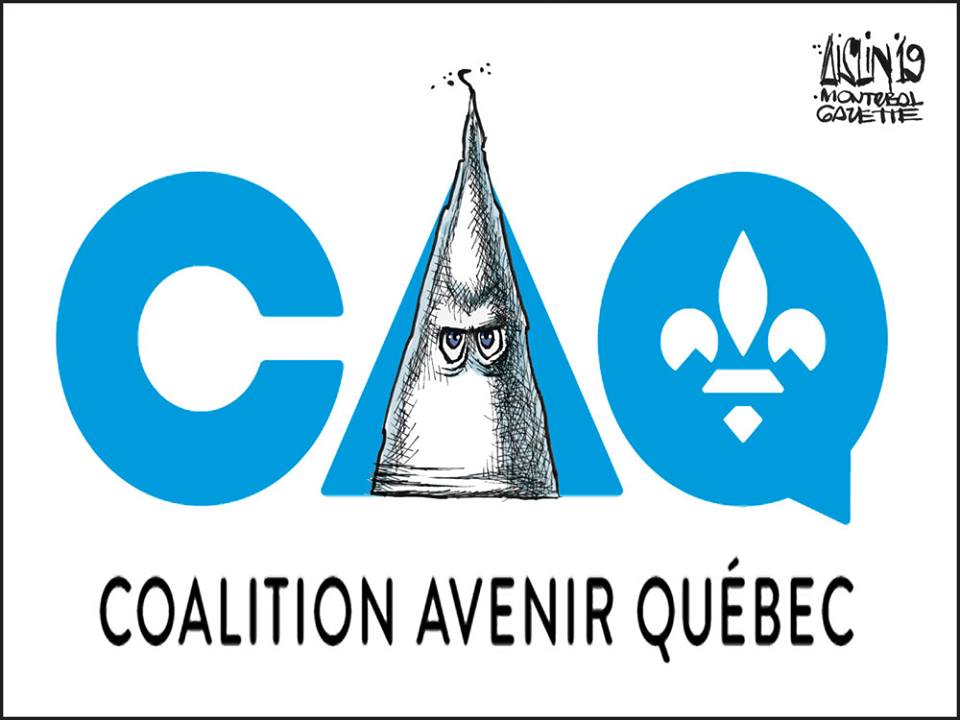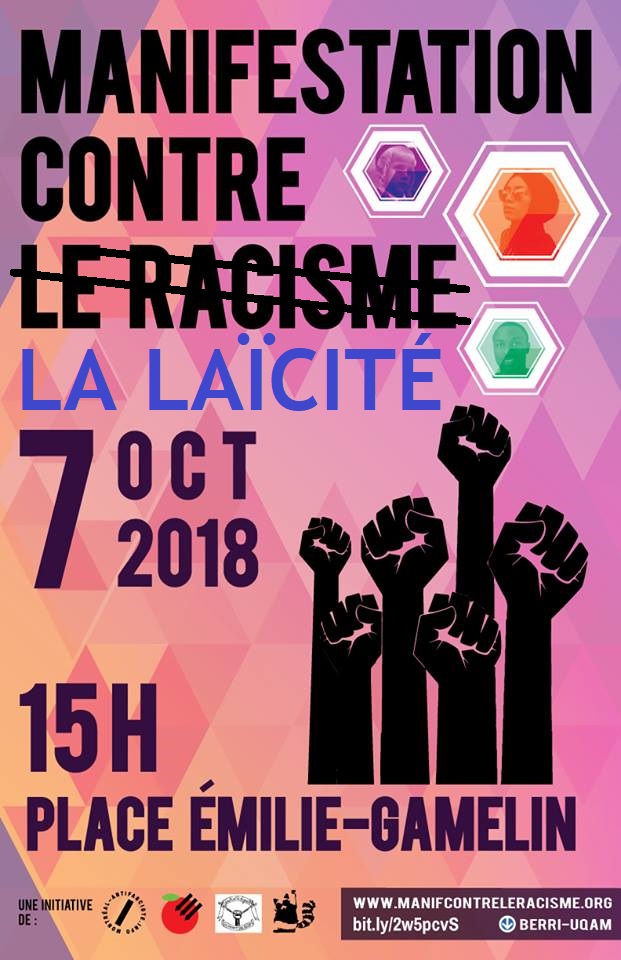2017-05-24, Summary & sommaire updated 2018-04-29
In this blog I discuss definitions of the terms “race” and “racism” and explain the necessary distinction between race and religion. Then I consider the exploitation of imaginary racism by various ideologues.
A slightly modified version of this article is published in no. 201 (Summer 2017) of the magazine Humanist Perspectives, under the title “Racism: Real and Imagined.”
Sommaire en français
Dans ce blogue je discute de la définition des termes « race » et « racisme » et explique la distinction nécessaire entre race et religion. Ensuite, je considère l’instrumentalisation du racisme imaginaire par divers idéologues.
Une version légèrement modifiée de ce texte paraît dans le numéro 201 (été 2017) de la revue Humanist Perspectives, sous le titre « Racism: Real and Imagined ».
Race and Racism
According to Wiktionary, a race is a group of people distinguished by common ancestry, heritage or physical characteristics, while racism is defined as a belief that “each race has distinct and intrinsic attributes” or “that one race or ethnic group is superior or inferior to another” or “prejudice or discrimination based upon race or ethnicity.” Races, to the extent that such categories exist, are fuzzy sets, that is to say, categories with uncertain boundaries, like clusters which often fade into each other along those boundaries.
I would suggest that definitions of race, and consequently of racism, vary along a spectrum from strict to lenient or general. The strictest definition would be based entirely on innate, physical, heritable characteristics, i.e. genetics, whereas more general definitions would extend to ethnic groups. Ethnicity is only partly based on genetics; for example, a person of a completely different race from the majority in an ethnic group may be considered a member of that group if he or she is well integrated into it, especially if that integration began in early childhood. Thus, prejudice against a particular race in the strict sense, such as a theory of racial superiority or inferiority, is racism strictly speaking. (For example, Jérôme Blanchet-Gravel in L’islamophobie considers racism to be a synonym of social darwinism.) On the other hand, prejudice against an ethnic group might more accurately be called ethnic prejudice, ethnic chauvinism or ethnic bigotry.
Race and Religion
However, if we wish to discuss religious affiliation, then it is clear from the above considerations that such affiliation is distinct from race and that religious bigotry—i.e. prejudice against a particular religious group—is certainly not racism, not even in the most lenient sense described above, because one’s religion is an acquired rather than an essential characteristic. One can change one’s religion in an instant, but not one’s ethnicity or race.
The only way to get around this obvious difference is to throw freedom of conscience out the window and declare “Once a Christian (or Hindu, Muslim, Pastafarian, etc.), always a Christian (or Hindu, Muslim, Pastafarian, etc.)” This now-false attitude nevertheless has an historical basis: for example the original Muslims were generally Arabs, the original Christians were mainly Jewish, and as for the Jews, even today Jewish ethnicity is regularly confused with the practice of Judaism. However Judaism, the original Abrahamic monotheism, is a tribal religion (as most religions probably were originally), whereas both Christianity and Islam have universalist pretentions, with the goal of converting people regardless of race or ethnicity, which in time they have indeed both done.
In summary, if you support the concept of freedom of conscience (which includes both freedom of religion and freedom from religion) then you must abandon the historical, tribal connection between religion on the one hand and race or ethnicity on the other.
Varieties of Racism
The issue of racism varies in quality and intensity in different countries and regions. There is anti-black racism in many countries, but it is particularly intense in the USA as a result of its history of slavery, the economic importance of slavery in that country and the denigration of Africans used as a rationalization for the inferior status of blacks. Christian scripture, so highly valued in the USA even today, was also used to legitimize slavery. In countries such as Canada and the U.K., slavery was abolished earlier and was much less important economically.
Nevertheless Canada and the British North American colonies which preceded it have a long history replete with racist themes. The British imperial mentality established a hierarchy of races and ethnic groups, the pinnacle occupied of course by the English, considered superior to the neighbouring Scottish, Irish, French and other Europeans and vastly superior to other groups such as Jews, Africans, the Chinese and other Asians. At the very bottom were of course the native peoples of the Americas. The intensity of such chauvinist and racist attitudes has diminished over time and Canada is much less racist than it used to be. Nevertheless, racism is not all in the past. Statistics indicate that blacks and Jews (along with gays) are the most frequent targets of discrimination. Grievous mistreatment of native peoples—including efforts to obliterate their cultures and languages—belongs to recent history and is not fully resolved.
Furthermore, the infamous “two solitudes” separating English- and French-speaking parts of Canada also lives on in the continued demonization of Quebec nationalists. The denigration of French-speaking Québécois is an example of ethnic chauvinism, i.e. “racism” in the general sense, as the Québécois represent a nation or ethnic group, not a race in the strict sense.
Racism tends to be “nicer” and more insidious in Canada, but more brutal and frank in the USA. American history involves a considerable degree of revolutionary fervour, made even more intense when combined with Christian arrogance—so natives were seen as subhuman undesirables to be cleared from the otherwise virgin land—whereas Canada was built as part of an expanding empire where subjugating conquered peoples was more efficiently done by negotiating (or pretending to negotiate) with them.
There is no symmetry between anti-white and anti-black racism. The latter is obviously far more widespread and serious.
Racism can of course go in any direction. Anyone who claims that anti-white racism is impossible can be dismissed as a preposterous ideologue. For example, the Nation of Islam of which Malcolm X was a member for several years believed that whites are devils and that blacks are superior to them. The point is not to deny the existence of such racism, but rather to recognize the asymmetry. There is no symmetry between anti-white and anti-black racism. The latter is obviously far more widespread and serious.
Dangerous Ideologies
Is racism a major ideological threat today, as it was, for example, in the early XXth century, manifested through ideologies of anti-semitism and German and Japanese racial superiority? In my opinion, no. That is, racism remains a serious problem, especially certain types and in certain regions, but it cannot compare with the global threat to human freedom from the following two ideologies:
- neoliberalism, i.e. free-market capitalism, and
- political Islam, a.k.a. Islamism or Islamofascism.
Neoliberalism is not racist. On the contrary, it tends to be anti-racist because it seeks to render all borders permeable or non-existent in order to maximize the freedom enjoyed by transnational corporations. However, neoliberals may use racism to justify or rationalize the negative effects of their economic policies: for example, denigrating sub-Saharan Africans as lazy and unproductive whereas in reality underdevelopment in Africa is more a result of neoliberal policies (while neoliberals claim their policies are required to remedy that underdevelopment). The denigration of nationalism and populism is used in order to weaken national boundaries or prevent new boundaries from being established. (Neither nationalism nor populism is good or bad in and of itself; either may be situated anywhere on the left-right political spectrum.) For example, the demonization of Quebec separatism is a mainstay of the Canadian political mainstream. Furthermore, this strategy is extended to stigmatize the republican secularism which many Quebec nationalists favour.
As for political Islam, it has nothing directly to do with race, and indeed, given its universalist, proselytizing program, it tends to be non-racist or even anti-racist like neoliberalism. However Islamism, again just like neoliberalism, regularly uses false accusations of racism as a propaganda tool. This is done in at least two ways: (1) by confusing religion with race in order to deflect criticism of Islamic dogma as “racist” or “Islamophobic” and (2) by confusing social darwinism with darwinism in order to denigrate evolutionary biology as “racist,” thus promoting creationism.
… both neoliberalism and Islamism use multiculturalism (i.e. communitarianism) as a propaganda tool.
Indeed, both neoliberalism and Islamism use multiculturalism (i.e. communitarianism) as a propaganda tool. For neoliberals, multiculturalism is divide and conquer, weakening nationalism, lowering expectations for social programs provided by the nation-state. For Islamofascists, multiculturalism essentializes religious identity to the detriment of citizenship, thus undermining freedom of conscience. They also share the strategy of denigrating their opponents as “racist” or “xenophobic” (or, in the case of Islamism, as “Islamophobic”). They even indulge in demonization of their opponents as “fascist” when in fact they themselves can arguably be described by that word. (See Neoliberalism is a form of Fascism or Le néolibéralisme est un fascisme by Manuela Cadelli. The term “Islamofascism” may be considered too modern and too kind to describe political Islam accurately, because it is a medieval theocratic totalitarianism; however, the term has the advantage of countering Islamofascists’ attempts to paint others as fascists.)
Thus, both ideologies are major threats to secularism. The threat from Islamism is direct and obvious. The threat from neoliberalism is more subtle.
Racism, Real and Imaginary
Thus, although true racism remains a reality in the modern world, we see that racism has in recent years become very widespread as a false accusation. Indeed, I would argue that the use of imaginary racism as a propaganda tool has become an even greater problem than racism itself, because these accusations are a major support for both neoliberalism and Islamofascism. Both ideologies exploit the issue for propaganda purposes, making false allegations which generate confusion but which have a certain degree of undeserved credibility because of the continued existence of real racism. Accusations of racism are very serious and represent a powerful form of intimidation and censorship. Secularists and atheists in particular are frequently targeted by anti-secular, pro-religious elements. Such false accusations are modern proxies for the old-fashioned crime of blasphemy.
… the use of imaginary racism as a propaganda tool has become an even greater problem than racism itself …
A particularly extreme example of this strategy is the behaviour of Chris Hedges, an icon of the American regressive left who is also a Presbyterian minister. Hedges regularly criticizes neoliberalism but fails to criticize Islamofascism. But even worse, he objectively apologized for Islamist terrorism in his response to the Charlie Hebdo massacre. Hedges also completely confuses race with religion and accused the late Christopher Hitchens of racism for his criticism of Islamism. Even worse, Hedges declared in a CBC interview that atheism is practically a form of racism. He is only one step behind Saudi Arabia whose position is that atheism is a form of terrorism.
Imaginary racism is a staple of the regressive left. The mentality of that fake left is maintained through dogmatic loyalty to spokespersons (such as Hedges) who do not deserve such loyalty—they deserve instead to be denounced for their betrayal of values which the left should defend, such as rationalism and secularism—and through fear and intimidation. Indeed, merely bringing up the issue of, say, immigration for discussion can get one accused of racism (or fascism), so many people are bullied into silence and debate is stifled.
Next blog: Notes sur le racisme, IIe partie

